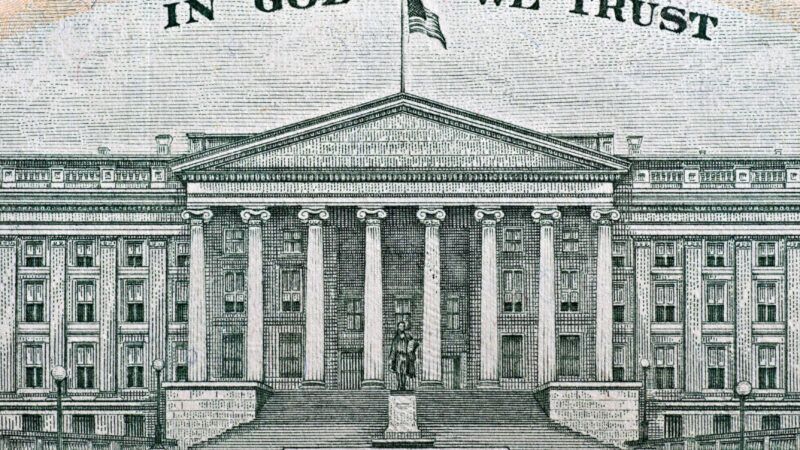Is a Government Shutdown Better Than More Reckless Borrowing?
Short-term solutions and governing from crisis to crisis isn't working.

The monthslong debate over raising the debt limit is barely in the rearview mirror, and already it's time for another round of brinksmanship over the federal government's fiscal future.
This time the stakes are a possible government shutdown at the end of the current fiscal year on September 30. That will happen unless Congress and President Joe Biden agree on a budget before then—which is highly unlikely—or agree to pass a short-term continuing resolution, which is how these fights are usually resolved.
The complicating factor is that some Republican members of the House are threatening to use a possible shutdown as leverage to push a variety of their preferred policies.
Some of those demands reflect important concerns about the fiscal state of the government and the growing budget deficit. The House Freedom Caucus wants to revisit the debt limit deal made by Biden and Speaker of the House Kevin McCarthy (R–Calif.) earlier this year, in the hopes of lowering spending levels for future years. Members are also demanding an end to what they call a "blank check" of military aid and funding for Ukraine.
But the group's demands also include more funding for a wall on the border with Mexico, new limits on which immigrants can be granted asylum, and a crackdown on the FBI. Some members of the group are attaching even-less-related issues to the budget negotiations: Rep. Marjorie Taylor Greene (R-Ga.), for example, told constituents last week that she would not vote to fund the federal government unless the House opens impeachment proceedings against Biden, CNBC reported.
Whether or not Biden deserves to be the subject of an impeachment inquiry, making these sorts of but-wait-there's-more demands only serve to distract from the essential debate here: the one over the federal government's unsustainable fiscal trajectory.
And unsustainable it is. The national debt is now larger than the American economy, something that's never happened outside of a few brief years during World War II. The budget deficit for the first 10 months of this fiscal year added another $1.6 trillion to the debt, and the short-term nature of most government borrowing means higher interest rates are adding fuel to this fiscal fire. By the end of the decade, interest costs on the national debt will exceed the size of the military budget and will only keep growing. And then there's the Social Security crisis looming in the early 2030s.
It's unfortunate that the only group of lawmakers trying to slam the brakes on federal spending is constantly being distracted by other, less important issues. Because, when it comes to the country's fiscal status, the Freedom Caucus is pretty much right.
"[People] say, 'The Freedom Caucus is a danger,'" Sen. Rand Paul (R-Ky.) told Axios earlier this week. "No, the danger is the status quo." As Axios also notes, Paul is not the only senator who seems sympathetic to the Freedom Caucus' maneuvers, though the majority in the upper chamber seems unwilling to consider a government shutdown. Senate Minority Leader Mitch McConnell (R–Ky.) has indicated that the Freedom Caucus is essentially McCarthy's problem to solve.
While we wait to see what happens next, it's worth considering how this new fight over a possible government shutdown reveals the foolishness of governing from crisis to crisis. Biden and McCarthy had an opportunity to head off some of the federal government's major fiscal problems earlier this year but instead settled for a debt ceiling deal that largely maintained the status quo—the new limits on discretionary spending do virtually nothing to solve the deficit, spending, or entitlement issues facing the country.
This year's federal budget deadline presents an even better opportunity for beginning the difficult process of solving those problems. At the very least, lawmakers should ask why federal spending has ballooned from $4.8 trillion to more than $6.2 trillion between 2018 and 2022, and how that increase in spending is driving deficits higher.
Punting on those tough questions doesn't make any of them go away. Instead, it will only create another crisis in a few months, and another opportunity for groups like the House Freedom Caucus to leverage the debate.
This is no way for a serious country to govern itself. It's fine to worry about the consequences of a government shutdown, but at some point Congress has to start worrying about the consequences of keeping the government open if doing so requires ongoing borrowing at unsustainable rates.


Show Comments (135)